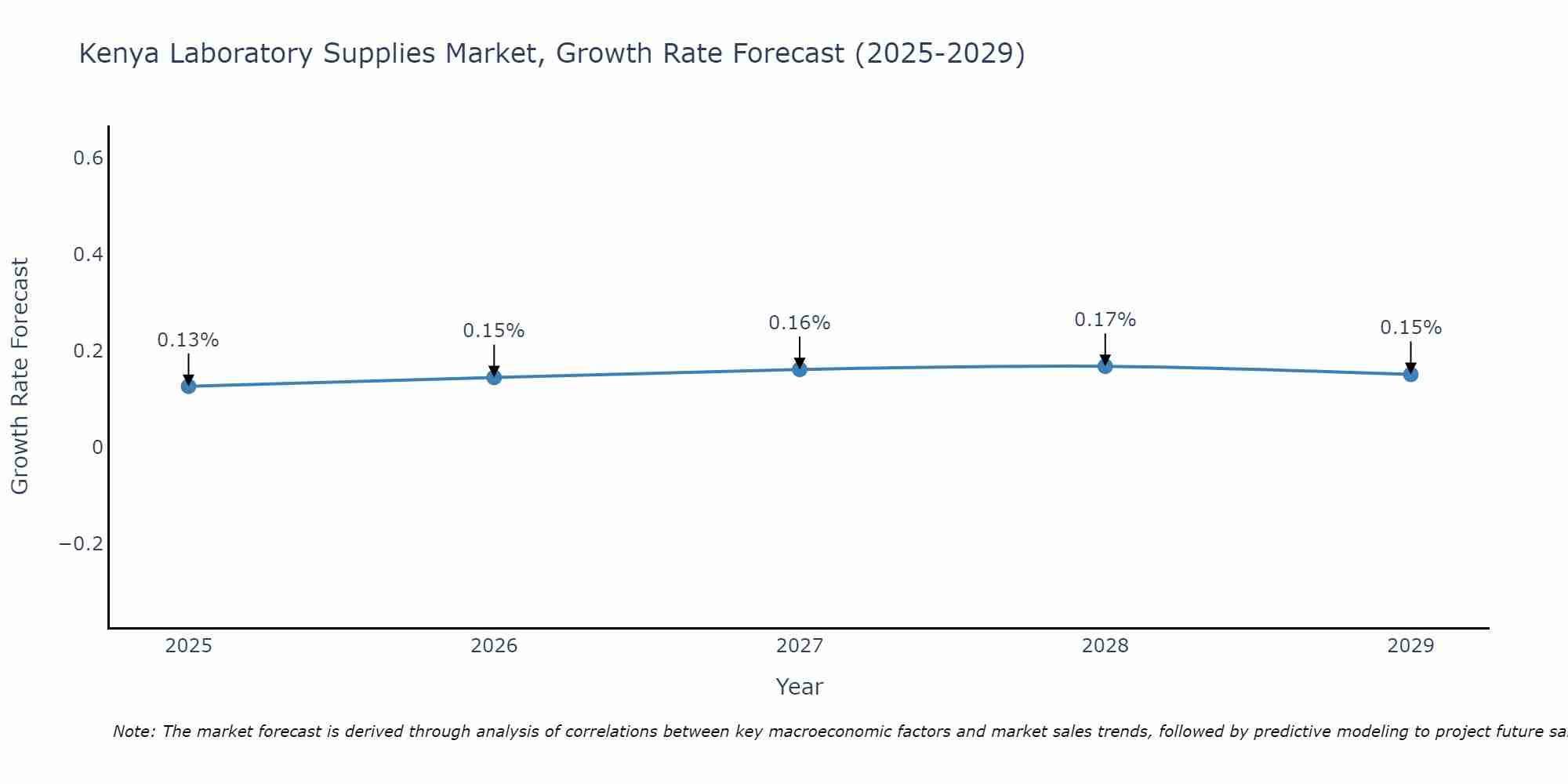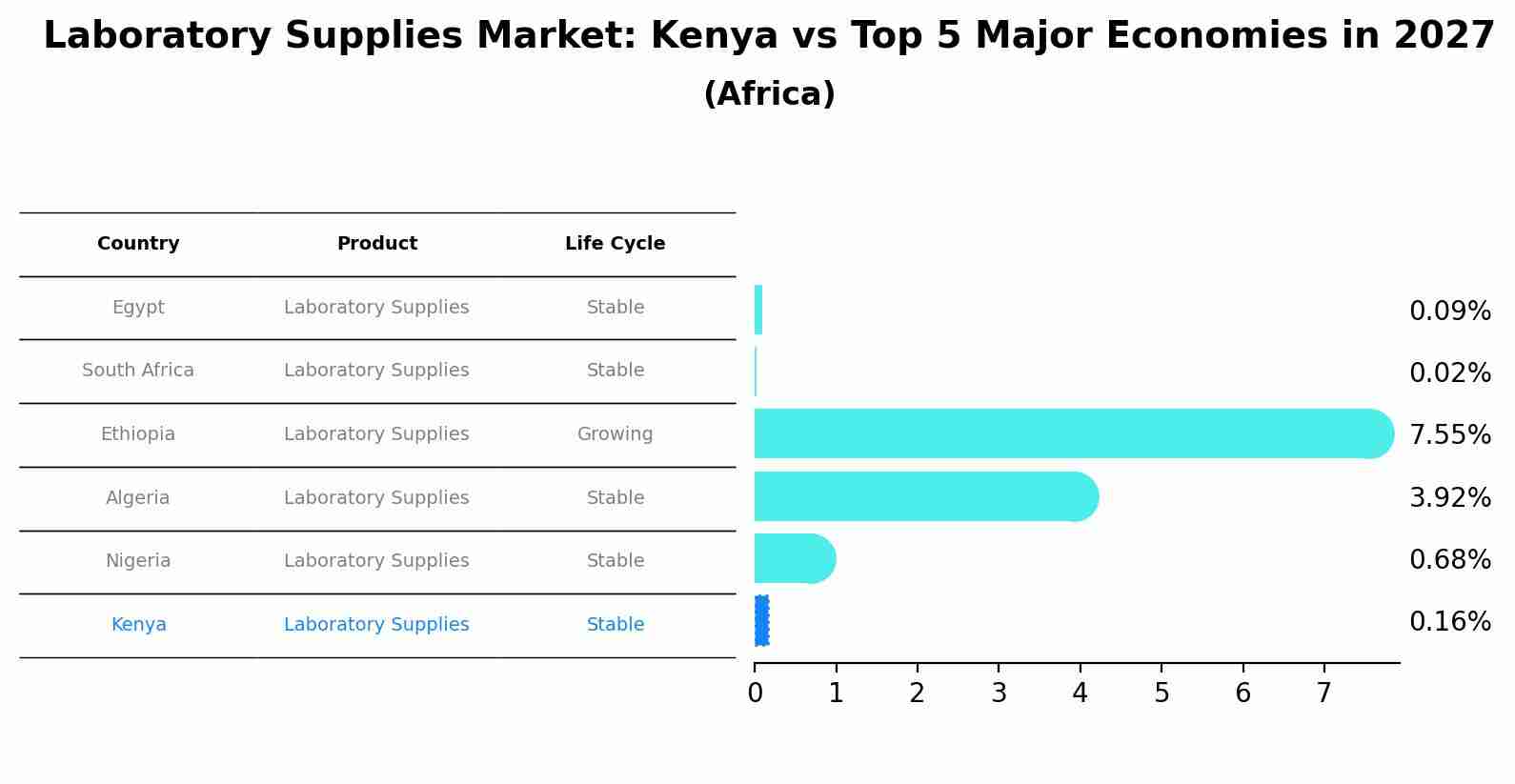Kenya Laboratory Supplies Market Outlook | Forecast, Size, Share, Analysis, Growth, Industry, Value, Revenue, Trends, Companies & COVID-19 IMPACT
| Product Code: ETC365870 | Publication Date: Aug 2022 | Updated Date: Aug 2025 | Product Type: Market Research Report | |
| Publisher: 6Wresearch | Author: Vasudha | No. of Pages: 75 | No. of Figures: 35 | No. of Tables: 20 |
Kenya Laboratory Supplies Market Size Growth Rate
The Kenya Laboratory Supplies Market is projected to witness mixed growth rate patterns during 2025 to 2029. The growth rate begins at 0.13% in 2025, climbs to a high of 0.17% in 2028, and moderates to 0.15% by 2029.

Laboratory Supplies Market: Kenya vs Top 5 Major Economies in 2027 (Africa)
By 2027, the Laboratory Supplies market in Kenya is anticipated to reach a growth rate of 0.16%, as part of an increasingly competitive Africa region, where Egypt remains at the forefront, supported by South Africa, Ethiopia, Algeria and Nigeria, driving innovations and market adoption across sectors.

Kenya Laboratory Supplies Market Synopsis
The Kenya Laboratory Supplies Market is experiencing steady growth driven by increasing demand for advanced equipment and consumables in research institutions, healthcare facilities, and industrial laboratories. Key factors contributing to market expansion include a growing focus on healthcare infrastructure development, rising investments in research and development activities, and the adoption of innovative technologies. The market offers a wide range of products such as instruments, reagents, chemicals, glassware, and plasticware, with strong competition among both local suppliers and international manufacturers. Government initiatives to improve healthcare services and quality standards are further fueling market growth. However, challenges such as limited access to high-quality products in remote areas and price sensitivity among buyers are factors that need to be addressed for sustained market development.
Kenya Laboratory Supplies Market Trends
In the Kenya Laboratory Supplies Market, there is a growing demand for innovative and high-quality laboratory equipment and consumables driven by advancements in research and healthcare sectors. Key trends include a shift towards digitalization and automation of laboratory processes to improve efficiency and accuracy. Additionally, there is an increasing focus on sustainability and environmentally friendly practices, leading to a rise in the adoption of eco-friendly laboratory products. The market is also witnessing a trend towards outsourcing of laboratory services by healthcare facilities and research institutions to specialized suppliers for cost-effectiveness and expertise. Overall, the Kenya Laboratory Supplies Market is experiencing a shift towards modernization, sustainability, and outsourcing practices to meet the evolving needs of the industry.
Kenya Laboratory Supplies Market Challenges
In the Kenya Laboratory Supplies Market, some of the main challenges include limited access to quality products due to a reliance on imports, inconsistent supply chain infrastructure leading to delays and higher costs, and a lack of standardized regulations affecting product quality and pricing. Additionally, competition from low-cost alternatives and counterfeit products pose significant challenges for businesses operating in this market. Moreover, the limited availability of skilled technicians and professionals in the laboratory sector further adds to the challenges faced by companies in ensuring efficient and accurate testing processes. Overall, addressing these challenges requires investments in local manufacturing capabilities, improvements in infrastructure, stronger regulatory frameworks, and increased training programs to enhance the quality and accessibility of laboratory supplies in Kenya.
Kenya Laboratory Supplies Market Investment Opportunities
The Kenya Laboratory Supplies Market presents promising investment opportunities due to the growing demand for quality laboratory equipment and consumables in various industries such as healthcare, pharmaceuticals, research, and education. Key areas for investment include providing advanced laboratory instruments, equipment maintenance services, laboratory furniture, and consumables such as reagents and chemicals. With the increasing focus on improving healthcare infrastructure and the rising number of research and educational institutions in Kenya, there is a growing need for reliable and efficient laboratory supplies. Investing in this market can be lucrative as businesses seek to upgrade their facilities and comply with international quality standards. Additionally, partnerships with local distributors and establishing a strong supply chain network can help investors capitalize on the market`s potential for growth.
Jordan Agar Market Government Policies
The Kenyan government has implemented various policies to regulate the laboratory supplies market. The Kenya Bureau of Standards (KEBS) is responsible for ensuring that laboratory equipment and supplies meet quality standards and specifications to safeguard public health and safety. Importers and manufacturers of laboratory supplies are required to obtain KEBS certification and adhere to relevant regulations. Additionally, the government has introduced tax incentives and initiatives to promote local manufacturing of laboratory supplies, aiming to reduce dependence on imports and enhance the country`s self-sufficiency. These policies aim to ensure the availability of high-quality laboratory supplies, promote local industry growth, and contribute to the overall development of the healthcare sector in Kenya.
Kenya Laboratory Supplies Market Future Outlook
The Kenya Laboratory Supplies Market is expected to experience steady growth in the coming years, driven by factors such as increasing investments in healthcare infrastructure, rising demand for quality diagnostics and testing services, and the government`s focus on improving healthcare facilities. The market is likely to benefit from technological advancements in laboratory equipment and supplies, as well as the growing awareness about the importance of quality testing and research in various industries. Additionally, the rise in infectious diseases and the need for accurate and timely diagnosis are expected to further propel the demand for laboratory supplies in Kenya. Overall, the market presents promising opportunities for suppliers and manufacturers in the healthcare and research sectors, with a positive outlook for expansion and innovation.
Key Highlights of the Report:
- Kenya Laboratory Supplies Market Outlook
- Market Size of Kenya Laboratory Supplies Market, 2021
- Forecast of Kenya Laboratory Supplies Market, 2031
- Historical Data and Forecast of Kenya Laboratory Supplies Revenues & Volume for the Period 2018 - 2031
- Kenya Laboratory Supplies Market Trend Evolution
- Kenya Laboratory Supplies Market Drivers and Challenges
- Kenya Laboratory Supplies Price Trends
- Kenya Laboratory Supplies Porter's Five Forces
- Kenya Laboratory Supplies Industry Life Cycle
- Historical Data and Forecast of Kenya Laboratory Supplies Market Revenues & Volume By Equipment Type for the Period 2018 - 2031
- Historical Data and Forecast of Kenya Laboratory Supplies Market Revenues & Volume By Analytical Equipment for the Period 2018 - 2031
- Historical Data and Forecast of Kenya Laboratory Supplies Market Revenues & Volume By General Equipment for the Period 2018 - 2031
- Historical Data and Forecast of Kenya Laboratory Supplies Market Revenues & Volume By Specialty Equipment for the Period 2018 - 2031
- Historical Data and Forecast of Kenya Laboratory Supplies Market Revenues & Volume By Support Equipment for the Period 2018 - 2031
- Historical Data and Forecast of Kenya Laboratory Supplies Market Revenues & Volume By Type for the Period 2018 - 2031
- Historical Data and Forecast of Kenya Laboratory Supplies Market Revenues & Volume By Repair And Maintenance for the Period 2018 - 2031
- Historical Data and Forecast of Kenya Laboratory Supplies Market Revenues & Volume By Calibration for the Period 2018 - 2031
- Historical Data and Forecast of Kenya Laboratory Supplies Market Revenues & Volume By Validation for the Period 2018 - 2031
- Historical Data and Forecast of Kenya Laboratory Supplies Market Revenues & Volume By Other Services for the Period 2018 - 2031
- Historical Data and Forecast of Kenya Laboratory Supplies Market Revenues & Volume By Service Providers for the Period 2018 - 2031
- Historical Data and Forecast of Kenya Laboratory Supplies Market Revenues & Volume By OEMS for the Period 2018 - 2031
- Historical Data and Forecast of Kenya Laboratory Supplies Market Revenues & Volume By Third-party Service Providers for the Period 2018 - 2031
- Historical Data and Forecast of Kenya Laboratory Supplies Market Revenues & Volume By Other Service Providers for the Period 2018 - 2031
- Historical Data and Forecast of Kenya Laboratory Supplies Market Revenues & Volume By Contract Type for the Period 2018 - 2031
- Historical Data and Forecast of Kenya Laboratory Supplies Market Revenues & Volume By Standard Service Contract for the Period 2018 - 2031
- Historical Data and Forecast of Kenya Laboratory Supplies Market Revenues & Volume By Customized Service Contract for the Period 2018 - 2031
- Kenya Laboratory Supplies Import Export Trade Statistics
- Market Opportunity Assessment By Equipment Type
- Market Opportunity Assessment By Type
- Market Opportunity Assessment By Service Providers
- Market Opportunity Assessment By Contract Type
- Kenya Laboratory Supplies Top Companies Market Share
- Kenya Laboratory Supplies Competitive Benchmarking By Technical and Operational Parameters
- Kenya Laboratory Supplies Company Profiles
- Kenya Laboratory Supplies Key Strategic Recommendations
Frequently Asked Questions About the Market Study (FAQs):
- Single User License$ 1,995
- Department License$ 2,400
- Site License$ 3,120
- Global License$ 3,795
Search
Thought Leadership and Analyst Meet
Our Clients
Related Reports
- Afghanistan Apparel Market (2026-2032) | Growth, Outlook, Industry, Segmentation, Forecast, Size, Companies, Trends, Value, Share, Analysis & Revenue
- Canada Oil and Gas Market (2026-2032) | Share, Segmentation, Value, Industry, Trends, Forecast, Analysis, Size & Revenue, Growth, Competitive Landscape, Outlook, Companies
- Germany Breakfast Food Market (2026-2032) | Industry, Share, Growth, Size, Companies, Value, Analysis, Revenue, Trends, Forecast & Outlook
- Australia Briquette Market (2025-2031) | Growth, Size, Revenue, Forecast, Analysis, Trends, Value, Share, Industry & Companies
- Vietnam System Integrator Market (2025-2031) | Size, Companies, Analysis, Industry, Value, Forecast, Growth, Trends, Revenue & Share
- ASEAN and Thailand Brain Health Supplements Market (2025-2031) | Strategy, Consumer Insights, Analysis, Investment Trends, Opportunities, Growth, Size, Share, Industry, Revenue, Segments, Value, Segmentation, Supply, Forecast, Restraints, Outlook, Competition, Drivers, Trends, Demand, Pricing Analysis, Competitive, Strategic Insights, Companies, Challenges
- ASEAN Bearings Market (2025-2031) | Strategy, Consumer Insights, Analysis, Investment Trends, Opportunities, Growth, Size, Share, Industry, Revenue, Segments, Value, Segmentation, Supply, Forecast, Restraints, Outlook, Competition, Drivers, Trends, Demand, Pricing Analysis, Competitive, Strategic Insights, Companies, Challenges
- Europe Flooring Market (2025-2031) | Outlook, Share, Industry, Trends, Forecast, Companies, Revenue, Size, Analysis, Growth & Value
- Saudi Arabia Manlift Market (2025-2031) | Outlook, Size, Growth, Trends, Companies, Industry, Revenue, Value, Share, Forecast & Analysis
- Uganda Excavator, Crane, and Wheel Loaders Market (2025-2031) | Strategy, Consumer Insights, Analysis, Investment Trends, Opportunities, Growth, Size, Share, Industry, Revenue, Segments, Value, Segmentation, Supply, Forecast, Restraints, Outlook, Competition, Drivers, Trends, Demand, Pricing Analysis, Competitive, Strategic Insights, Companies, Challenges
Industry Events and Analyst Meet
Whitepaper
- Middle East & Africa Commercial Security Market Click here to view more.
- Middle East & Africa Fire Safety Systems & Equipment Market Click here to view more.
- GCC Drone Market Click here to view more.
- Middle East Lighting Fixture Market Click here to view more.
- GCC Physical & Perimeter Security Market Click here to view more.
6WResearch In News
- Doha a strategic location for EV manufacturing hub: IPA Qatar
- Demand for luxury TVs surging in the GCC, says Samsung
- Empowering Growth: The Thriving Journey of Bangladesh’s Cable Industry
- Demand for luxury TVs surging in the GCC, says Samsung
- Video call with a traditional healer? Once unthinkable, it’s now common in South Africa
- Intelligent Buildings To Smooth GCC’s Path To Net Zero


















